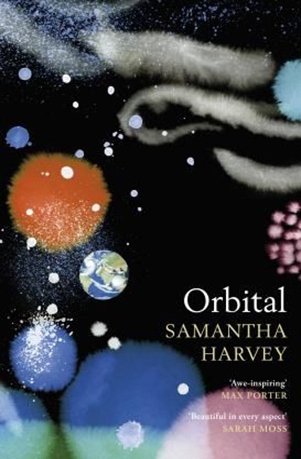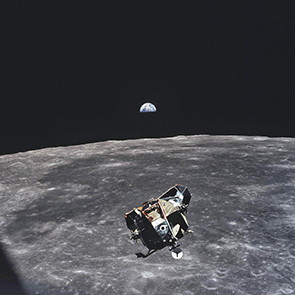Orbital is the story of a day in the lives of six Astronauts and Cosmonauts living in the International Space Station (ISS). The plot is basic and avoids conventional narrative development. We learn something about each of the six people on board, but there is no real drama or conflict to drive a plot, and the crew act mostly as observers of the real story – the real drama – that happens below. America is launching its first manned mission back to the Moon in over fifty years. At the same time a massive typhoon has unexpectedly developed into a category five event and is heading towards the Philippines. The typhoon may recall to Pietro’s mind a fisherman and his family whom he befriended in the Philippines during his honeymoon, but they remain a mostly abstract concern in the detached environment of the ISS. Chie’s mother has just died and she will miss her mother’s funeral, but anything the six crew members may feel, believe, or think about their own lives, pales into insignificance against the vast canvas of the earth and the wider universe. To the extent that Orbital is about people, it is about humanity: our place in the cosmos and in the vast tracts of time, as well as of our uncertain future as the planet becomes more degraded. Is Mars a viable target after the Moon? Will we, as a species, eventually escape to the stars? Though we learn something about each of her characters, Harvey hasn’t populated her novel with people to engage merely with personal stories. The six crew members are our surrogates – our eyes and ears – and we are cast in the role of observers by the narrative voice which speaks to us directly, sometimes using second person for whole chapters at a time.
Nevertheless, Harvey does accommodate conventional narrative expectations of readers. Her characters feel real to us though they are not complex or developed. We learn that Anton, one of two Russian cosmonauts on board, has a shaky marriage and may be facing a health scare. Chie, a Japanese astronaut, has just been told of the death of her mother, and her thoughts are consumed with her memory. She won’t be able to attend any funeral service. Nell, an English astronaut, was strangely inspired by the Challenger disaster to go to space, and we sense that her ambitions do not mesh well with her husband’s desire for a simpler life. Shuan, a Christian, surely the oldest of the crew, remembers the first moon landing. Pietro has quelled his sexual interest in Nell for the sake of the mission, while Roman, the second Russian on board, seeks to communicate with random people on earth via an old radio, just like his space hero, Sergei Krikalev. In each character is embodied the frailties of the individual and the potential they represent for humanity’s future.
I found it hard not to think of a few films as I read Orbital: 2001: A Space Odyssey and Alien come to mind. I was first reminded of Alien through the strong sense of the maternal in this novel. It’s a theme that runs through the Alien films. Ripley becomes a mother to Newt in the second film, but I particularly remember that the AI running the ship in the first film is called ‘Mother’. In Orbital, the earth is likened to our mother, but space is also likened to a womb; the vast tracts of space in which humanity may begin its next chapter. But in particular, the confined space of the ISS is the incubator for this next development in human evolution. The physiological tests which are constantly performed by the astronauts are done not for their own sake, but to gather information which will help the design of future space exploration. “They are data,” the narrator states unemotionally. “Above all else, that. A means and not an end.” The astronauts, themselves, provide the information which will propel humanity forward, leaving them behind. Already the latest moon mission is bypassing them, ensuring that one day they and the ISS will be irrelevant.
Every aspect of the novel emphasizes aloneness, insignificance, even irrelevance. From the vast swathe of humanity to the individual, we are either alone in the universe, it seems, or simply alone. The scientific method is a harsh tool that has no feeling for us in what it reveals. Religion is more comforting but its efficacy is more questionable. Anton recalls the utter solitude of Michael Collins as he orbited the moon alone in Columbia, the Command Module, in 1969. A photo Collins took of the moon and the earth seems to underscore this utter separateness, since Collins is famously said to be the only human not in it; a metaphor, perhaps, for humanity’s place in the cosmos. Collins wrote of his experience:
I am alone now, truly alone, and absolutely isolated from any known life. I am it. If a count were taken, the score would be three billion plus two over on the other side of the moon, and one plus God knows what on this side.
Knowledge, and the search for it, can be unsettling. But Collins is also the author of this image, even if he seems divorced from it. In reality, no other human appears in the image and the only human of any agency is Collins, himself. It is a paradox the novel encourages while considering humanity’s relationship with the vast unknown:
We matter greatly and not at all. To reach some pinnacle of human achievement only to discover that your achievements are next to nothing, and that to understand this is the greatest achievement of any life…
For some readers the tenets of the novel may seem bleak. Yet, despite its scientific underpinnings, Orbital is a deceptively simple yet great novel. It’s language is lyrical, uplifting, and the general tenor is inspiring rather than negative. The petty politics of earth are eschewed by the crew of the ISS, though they are still pawns in the politicking surrounding its existence. And while each crew member is attuned to their own personal problems, their mission transcends the individual. There is something great in collective human achievement – something to be admired – that the unsentimental dictates of science facilitate. For this reason, Orbital sometimes feels like an ambivalent novel, pitting the achievements of over half a century of human striving with the vast, unforgiving and uncaring expanse of the universe; a book in which the comforts of religion seem paltry, and the individual stories of the astronauts too parochial, too personal, in themselves, too unworthy of the novel’s final denouement.
When the crew finally falls asleep watching a film about the alien possession of two cosmonauts, we may be reminded of films like Alien, but the novel is more attuned to Arthur C. Clarke’s 2001 (or Kubrick’s film) in which the Star Child represents a new phase of human evolution in space. It is the earth we watch, spinning below the ISS, and to space we look as the novel closes and the crew sleeps. This is not a story that will devolve into alien possession or a human conflict. The timescales revealed to us are too vast for such commonplaces. Like the docking scene of 2001 in which Floyd’s ship engages in a balletic entry into the space station to the tune of Strauss, the ISS maintains its orbit in simpatico with the earth, and we sense a vast reality that dwarfs us. Like Michael Collins in Columbia, we are both nothing and everything at this moment of humanity’s observation of the universe. In another visual metaphor from the novel, Diego Velázquez’s painting Las Meninas, can be likened to Collins’s photograph. The viewer is both observer and observed, since the subjects of the painting peer back out at us as, presumably, our own portrait is painted. As humans we are everything and nothing special: are god-like but mired in our own animal instinct. It is part of the ambivalence of this novel, that it can place its six protagonists in a position of god-like observers as they rotate about the earth, but also acknowledge that we are mere animals, hoping to migrate. Reading this novel is both inspiring and humbling.

 RSS Feed
RSS Feed Facebook
Facebook Instagram
Instagram YouTube
YouTube Subscribe to our Newsletter
Subscribe to our Newsletter






No one has commented yet. Be the first!